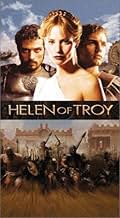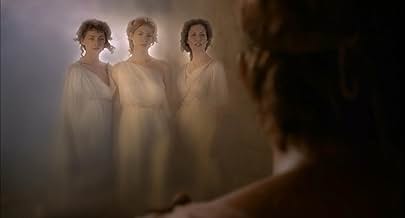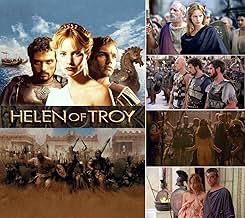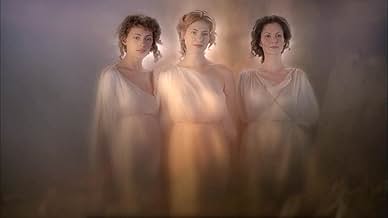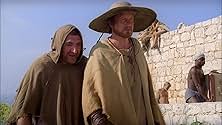L'enlèvement de la belle Hélène, épouse du roi spartiate Ménélas, par Paris de Troie déclenche une longue guerre.L'enlèvement de la belle Hélène, épouse du roi spartiate Ménélas, par Paris de Troie déclenche une longue guerre.L'enlèvement de la belle Hélène, épouse du roi spartiate Ménélas, par Paris de Troie déclenche une longue guerre.
- Nommé pour 1 Primetime Emmy
- 1 victoire et 7 nominations au total
Parcourir les épisodes
Avis à la une
In connection with mythology, our class was given the opportunity to view the film, Helen of Troy, last July 26 to August 2, 2005. Helen of Troy, released during the year 2003, is a movie produced by Ted Kurdyla and directed by John Kent Harrison. It was based on Homer's "Iliad" and its primary focus is "The Trojan War", which is one of the greatest stories in Ancient Literature. The film involves the story of Helen, the most beautiful woman in the world, being married to Menelaus in a land called Sparta. When Prince Paris comes to seek peace with Sparta, Helen falls madly in love with him and follows him to Troy. Enraged, Menelaus calls upon the Greek army to fulfill the oath they once swore: to defy anyone who stole Helen. From thus, the battle for Helen's love was started, putting the lives of many great warriors at stake. Although, the story presented a different plot from the text, people who haven't read it would be able to grasp the main idea from the movie. I was disappointed by the way the writers portrayed the character of Achilles, especially his line: "I stand before High King Agamemnon". Achilles was not under anyone, not even the highest of Kings; he cared for his own skin and fought for his own glory. Making him faithful to Agamemnon and responsible for no one else was a mistake because it means to show there were no other people involved who concerned Achilles. I also did not like the reason the writers made for Achilles killing Hector. According to the text, Achilles kills Hector to avenge his best friend's death not to save Agamemnon. Another significant difference was Helen begging for the body of Hector from Agamemnon, which was wrong; I believe it's important that Priam, Hector's father, was the one who asked for his son's body from Achilles because it shows that despite all the people Achilles has killed, there was still compassion left in the heart of even the most ruthless warrior. What worked particularly well for the film was the focus on Helen's royal family; it explained a lot about Helen's background, thus giving the audience more information than in the text.
I give this movie, a final rating of 4. The setting, effects and the cinematography was great. It made me feel as if it's the exact place where the battle happened. Helen of Troy is a movie that immediately captures its audience, engraving into their hearts the message it wishes to impart, which is: there will always be people who are ready to fight, whether it be for love of country, love of glory, or simply loving someone.
I give this movie, a final rating of 4. The setting, effects and the cinematography was great. It made me feel as if it's the exact place where the battle happened. Helen of Troy is a movie that immediately captures its audience, engraving into their hearts the message it wishes to impart, which is: there will always be people who are ready to fight, whether it be for love of country, love of glory, or simply loving someone.
There were several images that were important in the movie. Helen really stood out to be the most beautiful woman at that time but there were a lot of differences from the text. In the movie, what she showed the audience was a childish lady who suddenly turns into a flirt. Sometimes, it is also hard to grasp her true emotions probably because this flirt image has enveloped her identity in the movie. What I admired about Paris was not his cute face. It is true that he looks fit for the character of Paris but what's more to that is you could see in his face his passion for whatever he's doing and saying. The image of a "pretty boy" was really fit for him. I am very fascinated with how Agamemnon was able to internalize his character very well. He portrayed a king who was really greedy but also showed a soft side. His facial expressions were also stunning especially his eyes. His portrayal of Agamemnon's character was constant all throughout the movie. Menelaus' identity was hard to depict because his identity in the Iliad was not totally exposed. What was admirable in him in the movie was his being a nice man or prince. I saw in him the change from the beginning of the movie to the end. You could see in him his sincerity in changing. Although Hector only had a small part, he was able to show the audience a noble Trojan. His image in the movie was different from the original text. He was not the strongest Trojan and he was even overpowered by his brother, Paris. Achilles was a totally different character. He was just a war and bloodthirsty warrior in the movie. It's as if he's just a bully in Helen of Troy.
The technical aspects for me were not that good. The voices were hardly audible. Sometimes, it's as if the actors and actresses were just murmuring to each other although the background music was suitable for the movie. It made you imagine what it was like before and how it felt during that time. There were scenes that were too dark that the characters could not be seen anymore but the shade of colors used were suitable for the time being illustrated in the movie. There were angles wherein a character was blocking someone else and it made it so hard to feel and see what's really happening but there were also shots that were nice. This was particular with the wooden horse. The angle of the shot made the wooden horse look so majestic and the audience would really be at awe with how the Greeks were able to come up with that plan and how they were able to make that wooden horse.
Overall, Helen of Troy is something worthwhile to watch not only because of Paris' look but also because the movie gave explanations on how things came to be and it brought its audience closer to the "reality" of the Iliad.
The technical aspects for me were not that good. The voices were hardly audible. Sometimes, it's as if the actors and actresses were just murmuring to each other although the background music was suitable for the movie. It made you imagine what it was like before and how it felt during that time. There were scenes that were too dark that the characters could not be seen anymore but the shade of colors used were suitable for the time being illustrated in the movie. There were angles wherein a character was blocking someone else and it made it so hard to feel and see what's really happening but there were also shots that were nice. This was particular with the wooden horse. The angle of the shot made the wooden horse look so majestic and the audience would really be at awe with how the Greeks were able to come up with that plan and how they were able to make that wooden horse.
Overall, Helen of Troy is something worthwhile to watch not only because of Paris' look but also because the movie gave explanations on how things came to be and it brought its audience closer to the "reality" of the Iliad.
I can't believe that the writers of this miniseries read any of the myths or the Iliad itself. The inconsistencies were truly amazing. But I guess it didn't matter, as the plot seemed to revolve around fighting and nudity. First of all Cassandra could not have told her father to kill the infant Paris; she did not receive her powers until she was a young woman. Apollo wanted her; she said yes and received the gift of prophecy; then, when she refused him, he could not take it back but cursed her that no one would believe her. Helen was not kidnapped by Theseus! Clytemnestra had three children, and Orestes and Elektra helped her wreak her vengeance for the death of Iphigenia. The gods & goddesses took a much more active part in the war, with Aphrodite telling Paris where to shoot Achilles and Athena guiding Odysseus, her favorite. The arrow in the heel meant nothing without the explanation. Agamemnon took Cassandra as part of his spoils. Hector had a wife, Andromache, whom he adored. Where was she? Where was Ajax?This was just too far from canon. One thing I did like was the loving relationship between Clytemnestra and her daughter Iphigenia; it was very understandable why she would kill Agamemnon.
As for the actors, Helen was not that beautiful. It was good to see John Rhys-Davies, but he was too thin and did not look well. Maryam D'Abo was made to look too old--an older actress should have been cast. She's still a Bond girl to me! Achilles was overplayed, and there was no reason for him to be bald. I did like Odysseus, however.
I'm not really sorry I watched it, just a little ashamed of myself for sticking out the whole four hours.
As for the actors, Helen was not that beautiful. It was good to see John Rhys-Davies, but he was too thin and did not look well. Maryam D'Abo was made to look too old--an older actress should have been cast. She's still a Bond girl to me! Achilles was overplayed, and there was no reason for him to be bald. I did like Odysseus, however.
I'm not really sorry I watched it, just a little ashamed of myself for sticking out the whole four hours.
DVD borrowed from my local public library, DTS sound, widescreen, each half on each of two disks, I watched it on consecutive nights. I was most drawn to it for Sienna Guillory, young British actress and daughter of a famous musician from Cuba, whom I had seen in the modern remake of 'The Time Machine.' She plays Helen of Sparta, who becomes Helen of Troy, and is the default object of passion which sparks the war and eventual fall of Troy, via the Trojan Horse. Agamemnon and Achilles are depicted as heartless killers with no redeeming qualities. I don't know what Homer had in mind, but this seems to be decidedly different from most earlier treatments of these mythical characters. The video transfer to DVD is very high quality, but the sharpness and realistic colors are not as effective as some period pieces (e.g. Gladiator) which use a mildly tinted image and selective focus to better depict the olden times. Still, for the type of movie it is, a worthwhile depiction of some important Greek mythology.
The Helen of Troy miniseries on USA today failed apparently because the writer lacked the nerve to tell the classic story, and instead made up his own. Instead of using Homer's Illiad as a starting point, the TVsters seemed to turn to the 1956 film as the primary source--turning the seduction/kidnap of Helen into a big ol' love story.
So many key elements were missing: the interventions of the gods, the quarrel between Achilles and Agamemnon, the killing of Patroclus in Achilles armor, Achilles subsequent killing of Hector, etc. This was the storyline of what we know of the myth of the Trojan War.
And major characters are triviliazed or disappeared: Hector's glory on TV is as a second banana to Paris; mighty Ajax gets a mention, little more; Diomedes, Nestor, Idonmoneus are absent. On the Trojan side, Aeneas, Sarpedon, Glaucus, Deiphobus and others are equally invisible.
Agamemnon is seen, not as a hero with the fatal flaw of hubris but a Hitlerian monster. Menaleas, a strong warrior in the Illiad, seems like he attended all the sensitivity training classes avaiable to the Achians, (the Greeks were referred to as "the Ageans" in the series), but wasn't much of a fighter.
But my biggest beef is with the character of Paris (Helen seemed commonplace, but acceptable). Paris was not much of a hero in the Illiad; actually, he was a bit of a feckless bounder. Helen's feelings toward him were decidedly mixed, with lust, pity, and contempt thrown together. Hector upbraided Paris on several occasions for his cowardice and sloth, but then, Paris occasionally entered the fray as an experienced soldier as well.
I sense the writers chickened out of grappling with a different kind of plot, and thereby missed an opportunity. The difficult interplay among the Greek heroes, the complicated moral choices on both sides, the tragic savagery of war, while existing to small degrees in the series, took back seat to a more or less conventional love story.
Too bad. Production values were fair, and some of the elements were there to make something better.
So many key elements were missing: the interventions of the gods, the quarrel between Achilles and Agamemnon, the killing of Patroclus in Achilles armor, Achilles subsequent killing of Hector, etc. This was the storyline of what we know of the myth of the Trojan War.
And major characters are triviliazed or disappeared: Hector's glory on TV is as a second banana to Paris; mighty Ajax gets a mention, little more; Diomedes, Nestor, Idonmoneus are absent. On the Trojan side, Aeneas, Sarpedon, Glaucus, Deiphobus and others are equally invisible.
Agamemnon is seen, not as a hero with the fatal flaw of hubris but a Hitlerian monster. Menaleas, a strong warrior in the Illiad, seems like he attended all the sensitivity training classes avaiable to the Achians, (the Greeks were referred to as "the Ageans" in the series), but wasn't much of a fighter.
But my biggest beef is with the character of Paris (Helen seemed commonplace, but acceptable). Paris was not much of a hero in the Illiad; actually, he was a bit of a feckless bounder. Helen's feelings toward him were decidedly mixed, with lust, pity, and contempt thrown together. Hector upbraided Paris on several occasions for his cowardice and sloth, but then, Paris occasionally entered the fray as an experienced soldier as well.
I sense the writers chickened out of grappling with a different kind of plot, and thereby missed an opportunity. The difficult interplay among the Greek heroes, the complicated moral choices on both sides, the tragic savagery of war, while existing to small degrees in the series, took back seat to a more or less conventional love story.
Too bad. Production values were fair, and some of the elements were there to make something better.
Le saviez-vous
- AnecdotesThis adaptation changes several aspects of the original legend of Helen. The gods play almost no role in the characters' lives, Helen is not shown to have any children and it's not explained how Cassandra supposedly got her powers. Instead, the series plays the story like a brutal historical event with little supernatural elements.
- GaffesIt is mentioned three times that Troy is the gateway to the riches of Byzantium. The city of Byzantium was founded in 667BC five centuries after the Trojan War.
- ConnexionsReferenced in In Praise of Action (2018)
Meilleurs choix
Connectez-vous pour évaluer et suivre la liste de favoris afin de recevoir des recommandations personnalisées
- How many seasons does Helen of Troy have?Alimenté par Alexa
Détails
- Durée1 heure 28 minutes
- Couleur
- Mixage
- Rapport de forme
- 1.78 : 1
Contribuer à cette page
Suggérer une modification ou ajouter du contenu manquant



